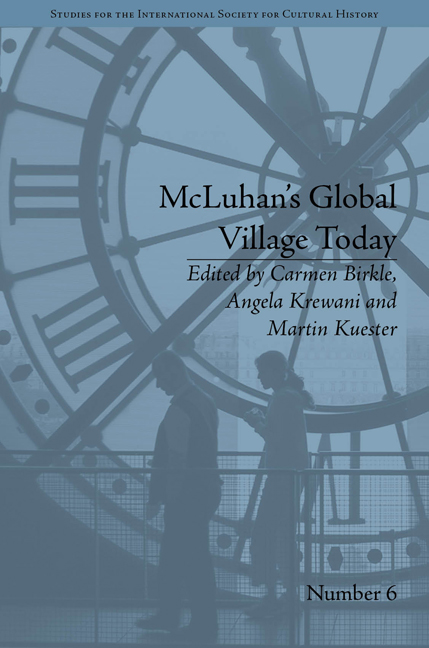Book contents
- Frontmatter
- CONTENTS
- List of Contributors
- List of Figures
- McLuhan's Global Village Today: An Introduction
- Part I McLuhan and Media Theory
- Part II McLuhan and Literature
- Part III McLuhan and Technical Media
- 11 Radio Voices: Reflections on McLuhan's Tribal Drum
- 12 McLuhan's Paradigms and Schafer's ‘Soundscape’: Parallels, Influences, Envelopes, Shifts
- 13 Literary Modernists, Canadian Moviegoers and the New Yorker Lobby: Reframing McLuhan in Annie Hall
- 14 The Animated Medium is the Animated Message (?): Reading Animated Moving Pictures with Marshall McLuhan
- 15 Marshall McLuhan and the Emergence of American Television Theory
- 16 ‘The Medium in Your Pocket’: A McLuhanian Approach to New Media
- Notes
- Index
15 - Marshall McLuhan and the Emergence of American Television Theory
from Part III - McLuhan and Technical Media
- Frontmatter
- CONTENTS
- List of Contributors
- List of Figures
- McLuhan's Global Village Today: An Introduction
- Part I McLuhan and Media Theory
- Part II McLuhan and Literature
- Part III McLuhan and Technical Media
- 11 Radio Voices: Reflections on McLuhan's Tribal Drum
- 12 McLuhan's Paradigms and Schafer's ‘Soundscape’: Parallels, Influences, Envelopes, Shifts
- 13 Literary Modernists, Canadian Moviegoers and the New Yorker Lobby: Reframing McLuhan in Annie Hall
- 14 The Animated Medium is the Animated Message (?): Reading Animated Moving Pictures with Marshall McLuhan
- 15 Marshall McLuhan and the Emergence of American Television Theory
- 16 ‘The Medium in Your Pocket’: A McLuhanian Approach to New Media
- Notes
- Index
Summary
As far as the operations of technical mass media were concerned, Marshall McLuhan was one of the first thinkers to offer a theory of modern technical media. His famous saying ‘the medium is the message’ (1964) distracts the cognitive interest from media contents (such as the story of a novel or a film) towards the recognition of the forms of media as structuring and semantic devices. The idea of media-structuring knowledge was completely new to a philosophical hermeneutic and humanist position which had been eager to ignore questions of the technicality of communication and content. Additionally, his understanding of media as ‘bodily extensions’ is a consequence of his notion of media processes and their structuring of a social and cultural order.
Marshall McLuhan developed a set of ideas on media which were contradictory and pointed to various aspects of media and media theory. His various approaches entail the idea of hot and cool media and media as bodily extensions. His remarks on cybernation offer an understanding of the computer as medium of communication long before the communicative and interactive aspects of the computer had been explored and developed.
Three aspects of his media theory will be addressed in the following essay:
His remarks on the bodily aspect of media – he reintroduces the body as a signifying and conceptual device into media theory – opposing the theories of Walter Benjamin and his attitude towards film.
[…]
- Type
- Chapter
- Information
- McLuhan's Global Village TodayTransatlantic Perspectives, pp. 177 - 188Publisher: Pickering & ChattoFirst published in: 2014

